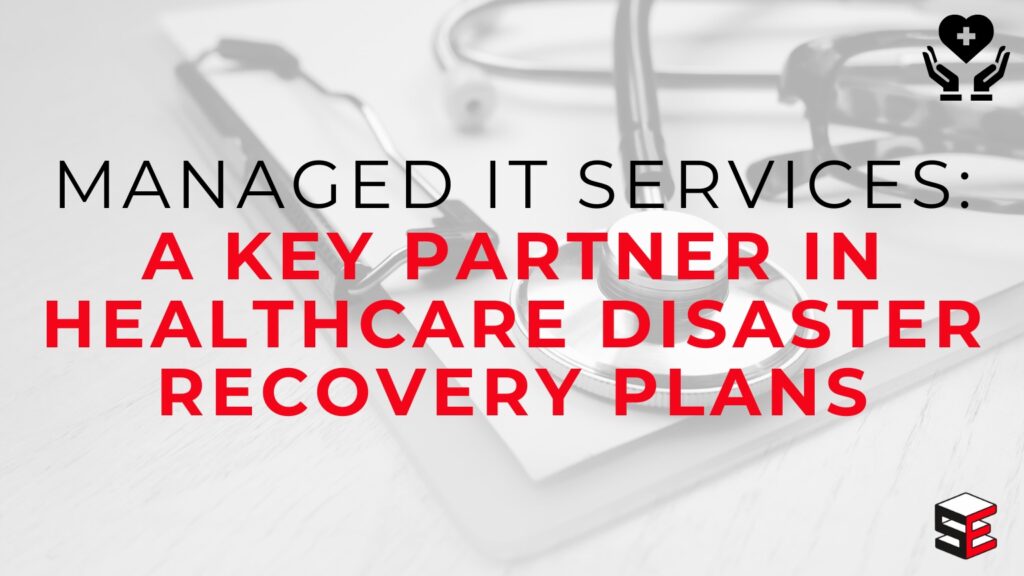In today’s digital landscape, healthcare organizations face a unique set of challenges in maintaining the security and accessibility of their data. From patient records to billing information, the data within a healthcare system is not just vital—it’s legally protected, confidential, and crucial for day-to-day operations. Any disruption to the flow of this data, whether due to cyberattacks, natural disasters, or system failures, can have disastrous consequences, including legal penalties, financial loss, and, in extreme cases, harm to patients.
This is where a Managed Service Provider (MSP) comes into play. A strong MSP partnership can be the difference between disaster recovery success and failure. By partnering with a trusted MSP, healthcare organizations can ensure their disaster recovery plans are comprehensive, resilient, and aligned with industry standards.
1 – Expertise and Industry Knowledge
Healthcare organizations often lack the in-house expertise to build and manage a robust disaster recovery plan. Managed IT Services providers specialize in understanding the unique needs of the healthcare sector. They have experience with compliance regulations such as HIPAA and are adept at developing disaster recovery strategies that meet industry-specific requirements. By partnering with an MSP, healthcare providers gain access to a team of experts who know exactly how to safeguard data, maintain operational continuity, and recover systems when needed.
2 – Proactive Data Backup and Security
A key component of disaster recovery is ensuring that your organization’s data is regularly backed up and protected. Managed IT Services include proactive data management, where MSPs can implement automated backups and real-time replication to ensure that data is always protected and can be restored quickly if necessary.
Additionally, MSPs monitor for security threats around the clock. Cyberattacks, such as ransomware, are a growing threat in healthcare, and MSPs help mitigate the risk by identifying vulnerabilities, patching systems, and responding to threats swiftly. In the event of an attack, they can help contain the damage, restore systems, and keep your organization running smoothly.
3 – Cloud Solutions for Scalability and Flexibility
Cloud computing plays a pivotal role in modern disaster recovery strategies. Managed IT services often provide access to cloud infrastructure, which enables healthcare providers to store critical data offsite. Cloud solutions offer scalability, meaning your disaster recovery plan can grow as your organization expands. Additionally, cloud services often come with robust data redundancy features, meaning your data is protected across multiple locations, ensuring that it remains accessible even in the event of a localized disaster.
For healthcare organizations, cloud-based disaster recovery allows them to recover more quickly and at a lower cost, avoiding the need for physical hardware replacement in the case of a disaster. Cloud systems also support remote access to critical data, ensuring that operations can continue smoothly even if physical office locations are disrupted.
4 – Business Continuity and Minimizing Downtime
In the healthcare industry, downtime is not just an inconvenience—it can directly impact patient care and business operations. MSPs implement business continuity solutions that ensure critical applications remain functional during an outage. Whether it’s using failover systems, virtualization, or alternative communication channels, MSPs are equipped to minimize disruptions to healthcare services.
By having disaster recovery and business continuity plans in place, healthcare organizations can ensure that they are never without access to important systems, even during an emergency. Whether it’s allowing healthcare providers to access patient records remotely or ensuring that critical applications (such as electronic health records or telemedicine systems) stay online, MSPs make sure operations continue seamlessly.
5 – Cost-Effectiveness
While implementing a disaster recovery plan may seem like an expensive undertaking, partnering with an MSP can make it more affordable. Instead of hiring an in-house team to manage backups, security, and recovery, healthcare providers can leverage the MSP’s expertise and infrastructure at a fraction of the cost. Managed IT services can provide a more cost-effective solution by offering packages tailored to the organization’s needs, providing predictable, ongoing support without the surprise costs of downtime or data loss.
6 – Compliance and Legal Protection
Healthcare organizations are required to adhere to a range of legal and regulatory requirements, such as HIPAA, to protect patient data. MSPs understand these regulations and can design disaster recovery plans that ensure full compliance, as well as assist in setting up encrypted data storage, regular audits, and detailed reporting, all of which help mitigate the risk of penalties due to non-compliance.
If a disaster were to occur, an MSP ensures that healthcare organizations can recover data quickly and provide documentation of the recovery process to demonstrate compliance with regulatory standards.
The healthcare industry is vulnerable to numerous risks, from cyberattacks to natural disasters, making a robust disaster recovery plan essential. MSPs are more than just an IT support provider—they are an integral partner in ensuring that healthcare organizations can quickly recover from disruptions, continue providing care, and stay compliant with regulatory standards.
By working with an MSP, healthcare providers gain peace of mind knowing that their IT infrastructure, data, and critical systems are protected and resilient in the face of any disaster. The right MSP will help healthcare organizations not just survive but thrive, ensuring that patient care never falters, even in the most challenging of circumstances.

